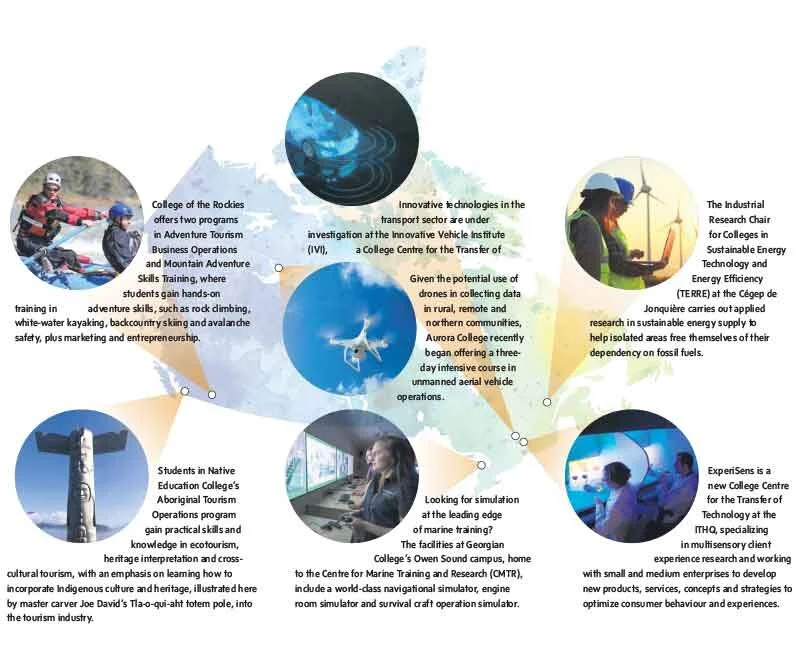Focus on higher learning
Back to school opportunities for all
Canada’s labour market is changing, with jobs being disrupted by technology and new opportunities emerging across the country. Colleges and institutes are responding with new programs, developed in close consultation with industry and communities.
Equity, diversity and inclusion are NOT MERELY buzzwords – they are values that are central to the stability and well-being of Canadian society. Against the backdrop of growing political polarization and wealth inequality, Canadian colleges and institutes champion these values. Not only do they pay attention to making their campuses inclusive, they also strive to give all students the tools to succeed in today’s labour market, says Denise Amyot, president and CEO of Colleges and Institutes Canada (CICan).
Colleges and institutes across the country offer support services designed to meet the needs of a variety of learners, with 19 CICan members being signatories of the federal government’s charter entitled Dimensions: Equity, Diversity and Inclusion Canada, says Ms. Amyot. “To ensure that every student feels accepted and integrated, colleges and institutes are removing obstacles, particularly those experienced by members of underrepresented or disadvantaged populations; for example, women, Indigenous people, persons with disabilities or belonging to ethno-cultural groups, or members of the LGBTQ2+ community.”
The commitment to eliminating barriers to higher education is especially important at a time when lifelong learning is a must, says Ms. Amyot. Workplaces are changing, with jobs increasingly being disrupted by automation, artificial intelligence or other new technology. To fulfill the objective of preparing graduates for successful careers, post-secondary education has to respond, she states, and Canadian colleges and institutes are ready for the challenge.
“Since we were created to serve the needs of the community, including industry and non-profit sectors, we can pivot on a dime,” she says. “We can adapt quickly to meet market needs with diverse program offerings, flexible learning options and meaningful connections to employers.”
Program advisory committees comprised of industry and community representatives inform the delivery of long-standing programs and the design of new offerings, says Ms. Amyot. “Our program advisory committees are made up of people who know what skills our graduates need. They provide advice on curriculum and equipment, on the labour market and internships. And very often, they will hire our graduates, because they know they are job-ready.”
Beyond delivering training that enables graduates to land a job, colleges and institutes go further – to instill skills that serve their students well beyond that first position, says Ms. Amyot. “We not only teach technical skills but also essential life skills.”
Soft skills – such as critical thinking, research, collaboration and communication – can enable people to succeed and become lifelong learners, she explains. “We also encourage entrepreneurial thinking so people can explore starting their own business.”
“Beyond delivering training that enables graduates to land a job, colleges and institutes go further – to instill skills that serve their students well beyond that first position. ”
The average age of students enrolled in colleges and institutes is 27, and Ms. Amyot says learners come from diverse backgrounds. They may arrive straight out of high schools, from workplaces for upskilling or reskilling, or from universities.
“Forty-seven per cent of our students in the college and institute system have previously attended a post-secondary institution, and 34 per cent already have either a diploma or degree,” she says. “To accommodate learners with such different needs and during different stages of their lives, we need to offer wrap-around services. We also have flexible learning options that include diplomas, degrees, post-graduate certificates, micro credentials, dual credentials, plus part-time, online, hybrid and accelerated programs.”
In addition, colleges and institutes offer customized programs that have been requested by industry and community partners, which could range from one hour, one week or one month to longer periods of training, says Ms. Amyot.
In short, there never is a closed door for Canadians interested in going back to school, she adds. “With over 10,000 job-focused credentials being offered, this means there are opportunities for everyone.”
About colleges and institutes canada
Colleges and Institutes Canada (CICan) represents Canada’s publicly supported colleges, institutes, cegeps and polytechnics, which work with industry and social sectors to train learners of all ages and backgrounds at over 420 campuses serving urban, rural and remote communities across Canada.
For more information, visit www.collegesinstitutes.ca.
For more stories from this feature, visit globeandmail.com



